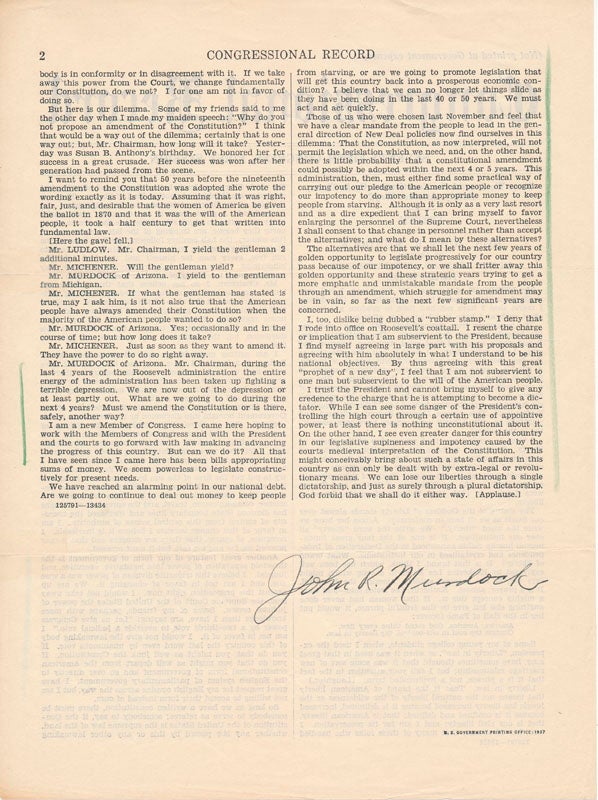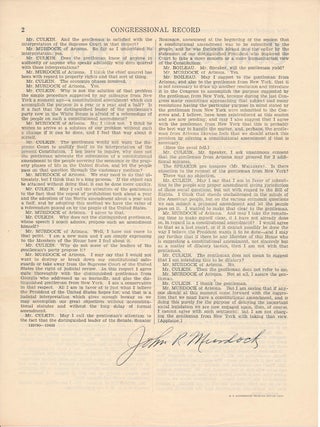What Did the President Mean When He Suggested "A More Enlightened View"? / Must We Amend the Constitution or Is There, Safely, Another Way?
This Arizona educator and college dean wrote books about government as well; from 1937 to 1953 served that state in Congress as a Democratic representative. Item #40654
Two offprints from the "Congressional Record," each 1p (recto and verso), 8½" X 11", dated 21 January 1937 and 16 February 1937 respectively. Very good. Faint original mailing folds. These two offprints both concern President Franklin D. Roosevelt's disastrous 1937 "Judicial Procedures Reform Bill" or "court-packing plan," legislation that would have allowed him to enlarge the court in such a way that would help push through his New Deal initiatives. It proved quite controversial and ultimately failed. But only two weeks after taking his congressional seat for the first time, Murdock the newbie M.C. stood up to support FDR's plan. He opens modestly, professing "it is rather presumptuous of me, as a new man, to rise so early in the session and explain in an offhand way my attitude toward the great issues which now confront us...." and concludes that he does not favor a constitutional amendment to approve FDR's plan. His second speech, delivered less than one month later, continues to oppose a constitutional amendment and to support Roosevelt, concluding "I trust the President and cannot bring myself to give any credence to the charge that he is attempting to become a dictator." At the conclusion of each of these speeches, Murdock signs large, bold and in full in black ink. This choice pair is accompanied by a Typed Letter Signed (rubberstamp), 1p, 8" X 10½", Washington, DC, n.y. Very good. On "Congress of the United States" letterhead, the neophyte congressmen writes to "Dear Fellow Citizen" that "So large a number of my constituents have written me regarding the proposed judicial changes that I find it convenient to send copies of my speeches and this form letter, because I cannot reply to each individually...." He then backpeddles wildly: "Please note... that my maiden speech... was merely explaining what I thought the President meant in his first message to this Congress. This was fifteen days before his message recommending judicial changes.... I had no idea that he would make any proposals, nor what he would suggest if he did propose change.... I feel that those of you who have written me in such grave alarm have been unduly perturbed in this matter...." In other words, he didn't feel FDR's court-packing plan would succeed. Ironically, this form letter is signed using a rubber stamp -- even though the second-to-last paragraph of his second speech begins, "I, too, dislike being dubbed a 'rubber stamp'"! A delightful trio -- and fortunately the original recipient, future Lincoln and Civil War scholar Arnold F. Gates (1914-93), had the foresight to request that Murdock sign each of his speeches. Most unusual.
Price: $150.00


